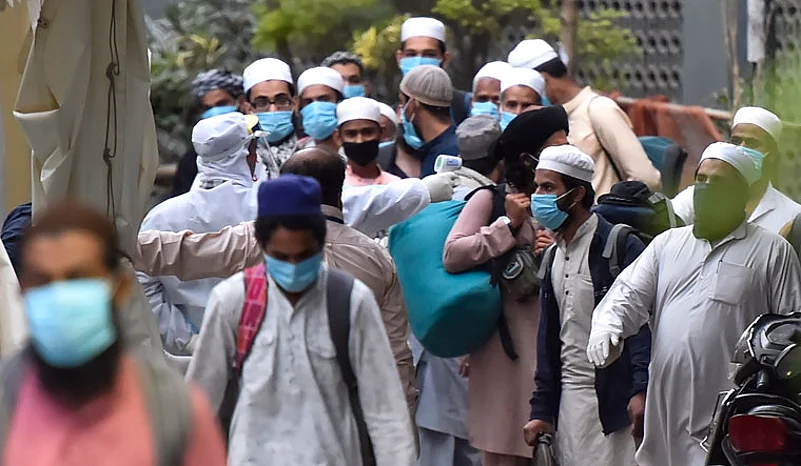With a Tablighi Jamaat congregation in Delhi’s Nizamuddin becoming an epicentre for COVID-19 spread across India, southern states are hurrying to identify and isolate those who attended the meeting.
In Tamil Nadu, the single biggest challenge for the authorities is tracking down every participant of the Tablighi Jamaat event from the state, especially those who have gone silent.
Over 1,500 people from Tamil Nadu had left for Delhi to attend the Tablighi Jamaat congregation at Nizamuddin Markaz. Of them, 1,131 have returned but only 800 have been located and quarantined. The remaining 331 people have gone "missing".
The police and revenue authorities, who have a better idea about the lay of the land, the number of houses and also the residents of any particular area, now spearhead the search operations across the state.
“Thankfully 110 people who went off the radar after returning from Delhi showed up at testing centres near their homes following the Chief Minister’s appeal on Wednesday. We are trying to locate the others who had returned to the state ahead of the March 25 lockdown by interviewing those who are now in isolation wards of different hospitals,” said a senior officer co-ordinating the search.
Though the state has managed to track 1,103 persons who returned from Delhi they suspect that the total number of persons who took part in the Jamaat event could easily cross the earlier estimate of 1,500 as they are discovering new clusters from across the state. “Even our estimate that the number of people from Tamil Nadu could be around 1,500 is only a “dynamic figure” as we arrive upon fresh disclosures about people from other parts of the state having attended the Delhi event,” the senior officer said.
For example, the interrogation of a group from Coimbatore, which incidentally reported the highest spike of 28 persons testing positive on Wednesday, revealed that another group from Chennai, hitherto not on the radar, had also travelled to Delhi. Now the authorities are scouring houses near the New College area of Royapettah in South Central Chennai to identify these attendees.
Once the Delhi returnees identify themselves, authorities take them away for testing and isolation. Then their family members are isolated and asked to stay indoors before they can be tested too. The authorities had to resort to extreme steps of cordoning off entire localities to prevent two-way traffic. For example, after 16 of the Tablighi Jamaat attendees from Melapalalyam – a Muslim dominated locality in the Tirunelveli corporation area – tested positive, the revenue and police authorities ordered a complete isolation of the area by barricading all roads with police check posts.
“Essential commodities are being sold within the barricaded area and we have advised the residents to remain indoors. And those showing symptoms are being taken to the government hospital in government vehicles for testing. Since this area lies in the middle of the town we have to cut off all vehicular movement except from government vehicles,” said Shilpa Prakash Satish, district collector of Tirunelveli.
Tracking, identifying, isolating, testing and hospitalisation if found positive and then testing family members followed by tracing those who had come in contact with the Jamaat returnees is proving to be a massive challenge for the state authorities. “For example, many returned to their homes before the lockdown either by flights or by trains. How do we track those who could have been in contact with these people? We can only hope that those who attended the congregations would have remained a tight-knit group even during their journeys. In that case what about those in railway stations, airports or cabs they had hired on their way home – it is an administrative nightmare,” said a district SP.
The authorities were further shocked when most of the returnees, on learning about the COVID-19 spread in their congregation, claimed that they had quarantined themselves. “Only upon close questioning, we learnt that this quarantine meant they had simply shut themselves in their homes with other family members and not remained isolated alone in a room. One person even innocently told the health inspector that he had only been playing only with his grandchild,” a senior health official revealed. Two others were found relaxing on the Poompuhar beach in the Mayiladuthurai district.
The revenue authorities are now urging the local mosques to create isolation wards in their premises where the male relatives could be housed till testing is done. “When many stay in small quarters it is unfair to expect them to isolate themselves in a separate room. If the local mosques can provide the space this can be a stop-gap arrangement till we shift them to hospitals after testing,” observed a district collector.
















